My favourite place to work in London, my private club and second home, was once described by Prince Charles as “the assembly hall of an academy for secret police”. He was directing his ire specifically at Humanities 1, the main reading room of the British Library. It’s true it doesn’t possess the Beaux Arts grandeur of New York Public Library’s Rose Reading Room, where the soaring ceiling is decorated with gilded plaster roses surrounding a cloud-tossed sky. By contrast Hum 1, as it’s invariably known, is a little bureaucratic, even dowdy, furnished with sober oak tables and green leather chairs. But its plainness is what makes it such an excellent place to work: a zone of mutual concentration, a temple consecrated to the endless delights of learning more about the world.
For a long time, the British Library was housed inside the British Museum, its magnificently domed reading room a favourite haunt of Lenin. But by the 1970s it had seriously outgrown its home. After years of wrangling, the new British Library was built in a derelict goods yard beside St Pancras station, the only space big enough for the largest public building constructed in Britain in the 20th century.
It’s a vast, red-brick Brutalist extravaganza, designed by the architect Colin St John Wilson: a gloriously tangible statement on the value of the written word. Consider this cheerful fact: there are approximately 800km of shelving in the British Library as a whole (275km in the extensive basements beneath the Euston building; the remainder at the storage facility in Boston Spa). Together, they house over 150 million items, of which around 2,200 receive conservation treatment each year. Books, mostly, but also newspapers, legal documents, photographs, maps, audio, stamps and scores.
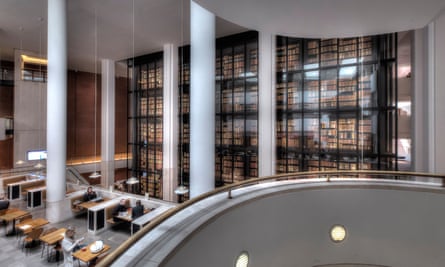
When I popped in last week, the piazza out front was packed with people: the usual motley collection of tourists, students and intent readers in hefty tweeds. I once spotted Salman Rushdie, striding across the square in a leather jacket. Up in Hum 1, someone had already bagged my favourite desk, 2185, marking their spot with an abandoned Samsung tablet. Complaining about seats is endemic among library regulars, as are tutting over ringtones, coughs, sneezes, fidgets, heavy breathers and the rising prices in the cafe (a tip: if you’re really desperate for a cheap Kit Kat, there’s an old-school vending machine hidden away at the back of the Cotton collection on the top floor).
The library is open to the public, but to gain entry to the reading rooms you need a reader’s card. Getting one used to be a laborious process but these days they’re granted to anyone over 18 so long as they’re in possession of the right identification and have a genuine research need to use the collections. Once furnished with a card, you must decant your possessions into a clear plastic bag, leaving coats, scarves and pens (the enemy of librarians the world over) with the affable cloakroom staff. Then you have to make it past two watchful security guards, who check you haven’t been secreting torn pages inside your laptop (“the Michael and Gabriel of a miniature heaven”, according to For Readers Only, an eccentric history of the old British Library written in 1936 by one J Penn).
All this creates strong bonds between library regulars. I use it as my social hub, taking frequent snack breaks with other long-term habitués of the stacks. Last week, everyone seemed to be bursting with enthusiasm over book proposals. I saw my old friend L, an academic over from Tokyo; drank too much coffee with J, high on finishing his master’s; and ate pastrami on rye with F, who was plotting an epic end to her new novel.
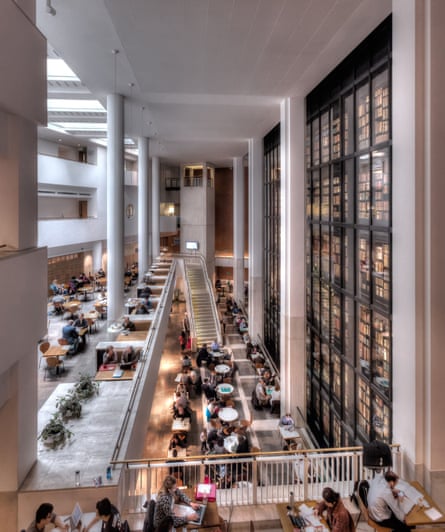
Writers, obviously, love the library. I’d already researched and written two books there when I became one of the Eccles Centre 2014 writers in residence, along with Erica Wagner. The award was established in 2012 to promote awareness of the library’s American collections, supporting two writers in their research each year.
I was working at the time on a book about loneliness and art, set in New York. I’d long since run out of funds to make research trips back to Manhattan: a growing problem, since some of my subjects were practically unknown in the UK. I was stunned to discover how much relevant material the library possessed, even on relatively niche figures such as David Wojnarowicz and Henry Darger. It wasn’t just books, either, but catalogues, films and oral histories. One of the most useful archives was the Hall-Carpenter oral history project, which mapped gay lives in the 20th century. I spent a brilliant afternoon with headphones clamped to my ears, listening to the photographer Leee Black Childers telling scurrilous stories about drag queens in 1960s Manhattan.
One of the perks of being an Eccles fellow was having a staff pass and a canteen card, allowing access to cut-price lattes and shepherd’s pie. But the best thing was the research assistance. I don’t know what I would have done without Carole Holden, head of the British Library’s American and Australasian collections, who shared many of my obscure enthusiasms. On my first day in the building, I visited her in the Eccles office. On her desk was Andy Warhol’s wonderfully batty pop-up book, Index, the only copy I’ve ever seen (it changes hands for alarming sums). The balloon had degenerated, gluing two pages together, but the pop-up can labelled Hunt’s Tomato Paste still leapt cheerfully to attention.
This is what you don’t get with internet research: the joy of paper, the thrill of handling an actual object, a refugee from time gone by. I’m between books now, and not going into the library so often, but sometimes as I fall asleep, I like to think of those kilometres of white shelves, descending far below London, and all the wonders they might contain.
Olivia Laing’s The Lonely City: Adventures in the Art of Being Alone will be published in March 2016 by Canongate, £16.99. Click here to pre-order it for £13.59
Joanna Briscoe, novelist: ‘This place just lifts my spirits’
Currently working on her sixth novel, usually in the Humanities reading rooms
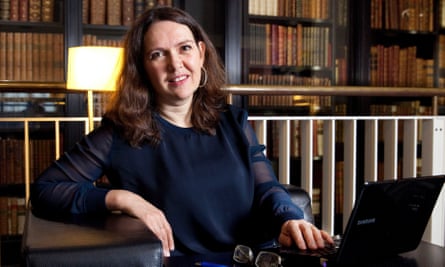
I started coming to the British Library about nine years ago and it’s definitely sorted out my working life. I come here three times a week and I’m much saner and more productive as a result. I can pretend to be normal and it forces me to get dressed and get on a bus, which is much healthier than working propped up in bed in your nightie.
Being a novelist is so solitary and I’m temperamentally not very suited to being on my own, even though writing’s all I want to do. There’s a real community here. I love that sense of collective endeavour, all of these people working, even if I don’t know them.
I used to live in Bloomsbury and I watched the library being built with fascination, but it didn’t occur to me to come here for years because I just thought the building looked so horrible. But inside, it’s inspiring and beautiful – the brass, the leather, the beautiful tiles, the juxtaposition of old and new, the sense of space and light. I just think it’s this amazing national treasure and it’s free, and I feel really passionate about it.
I’m working on my sixth novel. It will be published in spring 2017 and I suppose you could describe it as a literary psychological thriller. It’s kind of dark and twisted and it’s about people being not what they seem. It’s all set around this area, between King’s Cross and Camden, so I’m right in the middle of it here. I’ve written about 60,000 words of the draft so far.
I had one of my biggest breakthroughs in the library when I was working on my last novel, Touched. It’s never happened before or since, but suddenly I just saw it all in one go – I got the title, the essence of the plot and most of the characters in this amazing, inspired session. I was just up there in Humanities 2, typing like crazy. If you have one of those rare epiphanies – and believe me, they’re rare – having that silence and space to get into the zone and to know you’re not going to be disturbed is an amazing privilege.
I tend to work in the humanities reading rooms, though I vary the chair on purpose. I don’t like getting stuck in a rut. I occasionally scowl at people for talking and the sniffers drive me mad. Sometimes I just want to pass them a tissue. If I get stuck, the shop calls. I buy all my books and birthday presents there. And I’ll meet editors or other writers in the cafe. It just brings a real sense of normality and a kind of office life, although it’s a romanticised office life, as it doesn’t have all the politics and problems of a real office.
The only time you really get talking to other library users is when there’s a fire drill. The fire alarm goes off and we all traipse outside and hilariously, they give you those foil blankets, even when it’s not that cold. Usually everyone invades the local hotel and cafe. You can recognise each other because you’ve all got the clear, plastic bags. I’ve made a few friends that way.
I don’t know what I did before I came here. I feel like I spent years in this lonely wasteland. I produced novels, but I was less happy. This place just lifts my spirits. JO’C
Taymah Anderson, student and entrepreneur: ‘Everybody’s focused... that makes you much more decisive’
Studying Caribbean history and how to set up a company
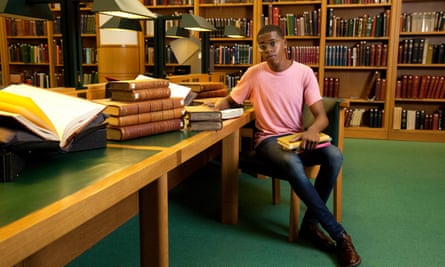
I’m from London – Harlesden. I’m third-generation Caribbean: Dad’s side is Jamaican, Mum’s side Grenadian. The main reason I’ve been coming here is personal: to learn more about the culture we had before we were colonised. There’s a lot of schooling on slavery but not much on what existed beforehand. For example, I know the Caribbean islands have a little Spanish, Dutch and even British heritage, so it’s about understanding that as well. I’ve mainly been looking at books in the African and Asian studies reading room, like Elizabeth Isichei’s A History of African Societies to 1870, and Soul of Black Folk by WEB du Bois.
But I’ve also been using the Business and IP [intellectual property] centre: they’re helping me start up my company with my sister, Samiah. We have a design creative consultancy called Our.s: at the moment we’ve been doing promotions, designing for events. We had the idea in February but it’s always been something I’ve wanted to do. So I went to the IP centre and they gave me a shedload of stuff: advice on how to register the company, a list of industry guides, useful links. The staff are extraordinarily helpful. I’ve been reading up on PR, design, and how to manage large groups of people. I also have a project developing an app for stage performances.
The aim is to be an art director: if I could do that in an advertising agency that would be great. I really think advertising can be a good force for change. I’ve been coming to the library for years: you can just sit upstairs with your laptop. I’ve brought friends here quite a few times. After long days at the library we go to a Turkish place in Bloomsbury called Pitted Olive. It’s a family business and their food does the Mediterranean taste justice and they always give filling portions. I like working at the British Library because everybody’s focused. Everybody looks like they know what they’re doing and that makes you much more decisive. You want to pick up a book, sit down, read it, really take it in, move on to the next thing – it’s that kind of culture. KB
Sally Smith, QC: ‘The staff brought me this dusty pile of books, tied up with bows’
Researching a biography of Victorian barrister Sir Edward Marshall Hall
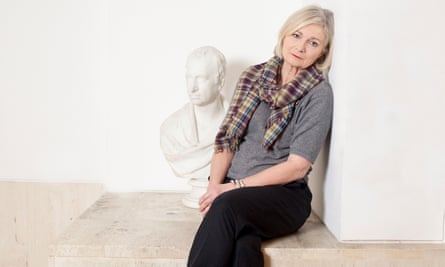
I got into law by accident really. I read history at the London School of Economics, and one day I went by mistake to a law lecture. I thought it was going to be on Tudor England and it turned out to be a lecture on contract, and because I was too shy to clamber over all these knees to get out, I sat there and listened and thought it was very interesting, and so I swapped to law. It was completely serendipitous. The LSE is close to the Temple and I used to wander around and think to myself: “This is the environment in which I would like to spend my life.” It’s a very beautiful, quiet, secret sort of place. I took silk in 1997. In my early days as a barrister I did a lot of crime but I went on to specialise in medical work. I did all the litigation for the Alder Hey hospital [at the centre of the children’s body parts scandal], I led the prosecution in the General Medical Council of the doctor who sought to draw a link between MMR and autism, and I’ve done the Mid Staffs public inquiry.
When my time is up I don’t want to think I have never done anything but be a barrister, however much I love it. I’m obsessed with biographies – I don’t care who they’re about – so I’d always thought I would like to have a go at writing one. This is a complete reinvention I suppose. My subject is Sir Edward Marshall Hall who was a barrister in late Victorian, early Edwardian England and is an extraordinarily romantic figure. He got more people acquitted from the death penalty than anyone else has ever. He achieved a level of fame which was extraordinary. Crowds of 10,000 would gather outside the Old Bailey waiting for the results of his trials. The headlines said he was the handsomest man in England, women used to scream and cry, and he was such a charismatic advocate that jurors just couldn’t resist him. When he died, shops closed along the funeral route.
George Orwell wrote a wonderful essay, Decline of the English Murder, saying we don’t get murders like we used to, where the defendant was usually someone rather smart and the crime was absolutely ghastly, and if you got the two together, you get a very good story. Marshall Hall had a whole series of these: the green bicycle murder, the murder at the Savoy, the brides in the bath. He didn’t always win but he always covered himself in this aura of glamour.
It was a fascinating period because forensics were really at an embryonic stage: it wasn’t until the 1900s they were able to distinguish animal blood from human blood and the first fingerprinting evidence was used in 1902. But coupled with that was the horror that they not only couldn’t prove anyone had done anything but they were hanging people left, right and centre, with no court of appeal.
Marshall Hall’s personal life was just as sensational as his professional life. He married his childhood sweetheart and they were absolutely miserable from the start. Even on his honeymoon there was great unhappiness and she ultimately went and had an affair with a French officer in the Indian army. She got pregnant by him and had an abortion and it was so appalling what they did to her that : it took her three weeks to die and the abortionist was charged with her murder. It was the great tragedy of Marshall Hall’s life but it was also said to be what made him such a wonderful advocate.
I wanted to find the French lover, and the Indian army records are kept in the British Library so that’s what first brought me here. I also found the memoirs of the cricket club that Marshall Hall played for when he went to Australia after having a breakdown at Cambridge. And I found the original documents of a psychical research society at Cambridge, the Ghost Club. Marshall Hall was a great friend of Conan Doyle, who was a spiritualist, and he dabbled in spiritualism too. The Ghost Club was started by a bunch of intellectuals and they just recorded their experiences of automatic writing, mediums and trance work. I ordered the documents and about an hour later the staff brought me this dusty pile of leather books wrapped up in brown paper and tied up with little bows.
I had no idea how nice librarians and archivists are. They love it when you’re interested because it validates them. That’s what they’re there for. In my job, it doesn’t matter how well you do it, there is always someone on the other side whose job it is to rubbish you. At the bar, we’re at each other’s throats half the time; this has beenis just as fascinating and much less stressful. It’s only in novels that barristers go out and sniff round murder scenes – in reality it’s all done for you and a brief presented to you – so I’ve had some extraordinary experiences going out and meeting people.
When I began, I thought biographies were the province of historians, but I’ve realised that everything I’ve ever learned about the laws of evidence you can apply to a biography. There’s no such thing as truth, there are only versions of events. In my own mind I really do approach it as I do cases. I apply a standard of proof and if I don’t think something is true on a balance of probabilities, I’m not putting it in the book, however appealing it is. JO’C
Sally Smith’s Marshall Hall: A Law unto Himself will be published by Wildy & Sons next spring.
Susan Ann Brewster, musician: ‘You can find things you’d never hear anywhere else’
Studies musical traditions and composition styles

I grew up in Wisconsin and moved to New York in 1979, when there was a huge rock’n’roll scene, and folk too. I did a lot of songwriting in those days. I moved to London in 1987, after I visited friends and became involved in some projects here. I’ve worked in fringe theatre, as a children’s entertainer, and as musical director in a theatre and education project. I’m currently working on some ideas around storytelling, mythology, maybe using puppets, incorporating elements of dance and opera.
I’ve been coming to the British Library since before the library was actually here, when it was still at the British Museum. For a while I thought I would miss the old museum – that lovely dome room was incredible, with the old lamps on the tables – but the atmosphere here is great. The library has changed a lot over the years, they’ve added more things: the exhibitions, for example, are really interesting, and I’ve taken courses at the business centre on startups, copyright, and using music for various media, like games.
It’s a great place to come and study, read things, listen to music. At the British Museum the collection wasn’t digitised in the way it is now: here you can find things you would never hear anywhere else. Lately I’ve been composing a piece for gamelan, which, in part, uses gongs and metallic instruments, so I came in and listened to old recordings which were amazing and rare. I also had to learn to score the music in kepatihan notation; as a western musician, it is not something I was familiar with.
I study a lot of musical traditions, but I’m also interested in very modern things, like electro-acoustic music. Last year I won an award for a composition called Golden Waves which used sounds from space. As part of an outreach project, the European Space Agency put out a call for composers to create pieces using sounds that are emitted by Earth – and probably other planets, too – called electromagnetic waves. The sounds normally can’t be heard by the human ear, but they were converted to sound waves we can hear by using a very low frequency receiver consisting of an antenna and a radio amplifier sensitive to radio waves. This made the waves audible.
I find the staff very helpful and approachable – you feel you can really speak to them. It’s a sociable environment without having to speak with people: you feel you belong to a community, which is really nice. KB
David Rosen, Psychology PhD student: ‘There’s something about the architecture. It has a calmness’
Uses the library for the reading rooms
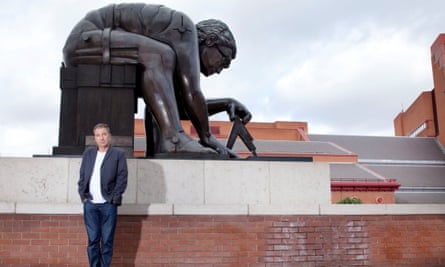
I’m four months into my PhD. I spent 20 years working in the pharmaceutical industry, in marketing and consumer behaviour, then I did a Master’s a couple of years ago in Durham and it was a complete eye-opener. After that, work always felt second best: I wanted to really engage and become an expert in one thing.
I’ve got an incredibly understanding wife: I told her “Look, darling, I want to give up work and do a PhD and earn no money now, because I’ve suddenly lost interest in everything to do with money,” and she’s been fantastic. It’s a privilege to do a PhD: it’s nothing to do with money, and it sounds trite, but you’re doing it because you want to give something back. I don’t think there’s a right age for doing it – I know PhD students who are 50, 60.
My research is in cognitive risk bias distortion within cardiovascular disease: in other words, how adults who are potentially at risk distort the perceptions of their lifestyle to convince themselves they’re not. Cardiovascular disease is the big elephant in the room: 155,000 people die from it each year, almost one person every three minutes, and 22,000 people die every year purely from cardiovascular disease related to smoking. And we all have to live with that, but we deal with it in different ways.
So my PhD focuses on the lies we tell ourselves to make us comfortable with our own behaviour. So we might smoke, drink heavily, be overweight, we might not take the medicines that our doctor has prescribed for us, but because of cognitive dissonance we distort the risk. I started off as a community pharmacist in an area where people had poor health literacy. And you can’t blame them: the amount of confusion and contradictory advice that goes out about health in the media is just phenomenal.
I come to the British Library about three days a week: the other days I go to Senate House Library, because the British Psychological Society’s collection is based there. But for pure studying I come here. I have a specific daily routine: every morning at 6.30 I swim in the lido London Fields in Hackney, outside, – partly to keep fit, partly for the endorphins – then I come in and have my coffee. Psychology research has shown that between 10am and 1pm is your optimum time for creative thinking, so that’s when I do my real hard thinking, then I tend to execute that between 1pm and 6pm.
For me the BL is an oasis for studying. The reading rooms are so fit for purpose: you’ve got beautiful light, fantastic wifi, large desks and it’s absolutely quiet. It’s interesting that nobody has to be here, everyone is here for the love of studying. There’s something about the building: I don’t know whether I’m imagining it or whether there’s actually something about the architecture, but it just has a calmness about it. And it also has the best coffee. KB
Leslie McMurtry, academic and writer: ‘I sit in seat 3066’
Researching radio dramas, historical resources and Doctor Who
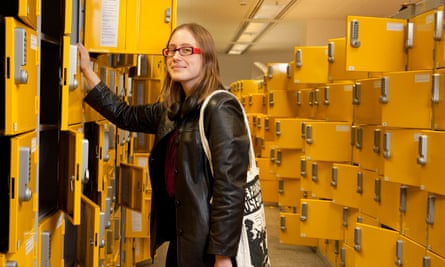
I’m from Albuquerque, New Mexico. I finished my PhD on radio drama almost a year ago: I fell in love with the form when I studied it for my MA. I first time I came to the British Library in 2009 when I won a grant to research and write a screenplay about the life of John Milton. I now have a day job – as a PA to a professor of women’s health – but I still come here as often as I can, at least once a week. I’m always researching something.
At the moment it’s Christmas-themed radio drama: there have been books about film and Christmas, but no one’s ever done a survey of that genre specifically. There’s a whole section here about sound and radio and I’ve used that extensively. I use the listening services: radio plays from the 40s, cassettes from the 80s. Some are very long, like a four-hour version of Dracula from 1998, but usually I like to break it up with some research. They have a collection of Radio Times going back almost to the beginning, so I’ve been combing through issues from 1935 to 1958, which is the period I’m focusing on.
I’m also doing research for a historical graphic novel I’m writing. It’s set around 1777 and I envision it being in seven volumes. One of my favourite primary resources for it is a book published in the 1750s-60s, Journal of a Soldier, about what it was like to join up and be in the seven years’ war, so I used that as a template. I’m trying to draw it as well, but I draw slowly, so I have a collaborator in Connecticut who is hopefully going to help me out.
I got into Doctor Who when I was a kid – I’ve always been an anglophile. Then, as it came back in 2005, I was in the right place at the right time; I was studying in Wales, which is where it’s filmed. I was running a fanzine, The Terrible Zodin, and as I was studying I infused more academia into the articles. Since then I’ve done conference papers, written articles and contributed to two books on Doctor Who. Since the 80s there’s been more and more academic writing on Doctor Who. They’re offering courses on it in some universities.
At the British Library they’ve got some rare video interviews with people who were involved with the production of Doctor Who, like Waris Hussein, who directed the first episode in 1963. They also have a biography of William Hartnell, who played the first Doctor, which is out of print now and goes for hundreds of pounds on eBay. And I’ve also researched the history of fanzines, particularly women and fanzines.
I study in Humanities 2, and I usually sit in seat 3066 if it’s free. It’s quite close to where all the radio books and Radio Times are. From time to time I notice the same people. There is one guy who I’ve seen every time I’ve ever been here. He’s always dapperly dressed in a light-coloured suit, and every time he seems to be working on a different subject, so I think he must be a ghost writer or something like that.
The best thing about the library is that I know I can just come in and work: it’s rare that I won’t find a title or there aren’t enough seats, and the staff are all really friendly. Everyone who has to do research should come here: it’s an amazing resource. KB
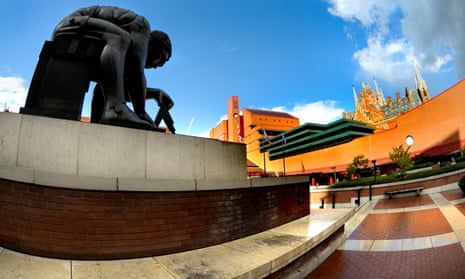
Comments (…)
Sign in or create your Guardian account to join the discussion